|
|
|
Sort Order |
|
|
|
Items / Page
|
|
|
|
|
|
|
| Srl | Item |
| 1 |
ID:
157411
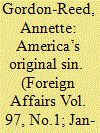

|
|
|
|
|
| Summary/Abstract |
The documents most closely associated with the creation of the United States—the Declaration of Independence and the Constitution—present a problem with which Americans have been contending from the country’s beginning: how to reconcile the values espoused in those texts with the United States’ original sin of slavery, the flaw that marred the country’s creation, warped its prospects, and eventually plunged it into civil war. The Declaration of Independence had a specific purpose: to cut the ties between the American colonies and Great Britain and establish a new country that would take its place among the nations of the world. But thanks to the vaulting language of its famous preamble, the document instantly came to mean more than that. Its confident statement that “all men are created equal,” with “unalienable Rights” to “Life, Liberty, and the pursuit of Happiness,” put notions of freedom and equality at the heart of the American experiment. Yet it was written by a slave owner, Thomas Jefferson, and released into 13 colonies that all, to one degree or another, allowed slavery.
|
|
|
|
|
|
|
|
|
|
|
|
|
|
|
|
| 2 |
ID:
069842
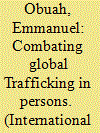

|
|
|
| 3 |
ID:
183674
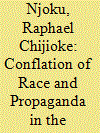

|
|
|
|
|
| Summary/Abstract |
The primary focus here is to accentuate the competing roles of race and propaganda in the enlistment of Africans and African Americans for the Second World War. Among other things, the discussion captures on the interwar years and emphasizes the subtleties of African American Pan-Africanist discourses as a counterweight to Black oppression encountered in the racialized spaces of Jim Crow America, colonized Africa, and the pugnacious infraction that was the Italo-Ethiopian war of 1935–1936. Tying up the implications of these events into the broader global politics of 1939–1945 establishes the background in which the Allied Powers sought after Black people’s support in the war against the Axis Powers. Recalling that Italy’s fascist leader Benito Mussolini attacked Ethiopia in 1935 with poisonous gas while the League of Nations refused to act, points to the barefaced conflation of race and propaganda in the Great War and the centrality of African and African Diaspora exertions in the conflict.
|
|
|
|
|
|
|
|
|
|
|
|
|
|
|
|
| 4 |
ID:
068425
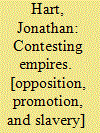

|
|
|
|
|
| Publication |
Hampshire, Palgrave Macmillan, 2005.
|
| Description |
xviii, 268p.
|
| Standard Number |
140396453X
|
|
|
|
|
|
|
|
|
|
|
|
Copies: C:1/I:0,R:0,Q:0
Circulation
| Accession# | Call# | Current Location | Status | Policy | Location |
| 051028 | 325.7/HAR 051028 | Main | On Shelf | General | |
|
|
|
|
| 5 |
ID:
123841
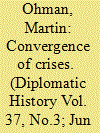

|
|
|
|
|
| Publication |
2013.
|
| Summary/Abstract |
This article argues that the Missouri Crisis 1819-1821 was a consequence of growing concerns about geopolitical realignments in the post-Napoleonic world and the impending international recession. Scholars have typically explained the conflict over slavery's expansion as the last convulsion of the first-party system, a reflection of budding humanitarian considerations, or as a product of the growing contradictions between slavery and freedom in an era of an emerging liberal capitalist ethos and a democratization of American politics. The central element of the northern restrictionist position, however, was that slavery's expansion into the western territories would seriously impede the United States' ability to compete economically and mobilize militarily in times of war. In light of persistent tensions with foreign powers, the perceived risk of renewed great power warfare, international markets glutted, and every branch of the economy paralyzed, restrictionists saw the halting slavery's expansion as a necessary measure to save the federal republic.
|
|
|
|
|
|
|
|
|
|
|
|
|
|
|
|
| 6 |
ID:
178425
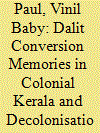

|
|
|
|
|
| Summary/Abstract |
This article seeks to decolonise knowledge of the conventional history of Dalits’ Christian conversion and its implications in colonial Kerala. As the missionary archive is the only source of Dalit Christian history writing in Kerala, in this historiography social historians have been unable to include the memories of Protestant missionary work at the local level by the local people themselves. Their experiences and rich accounts are marked by dramatic actions to gain socio-economic freedom and to establish a safe environment with the scope for future development. This article identifies how Dalit Christians themselves, in a specific locality, remember their conversion history, suggesting thereby the scope for a valuable addition to the archive.
|
|
|
|
|
|
|
|
|
|
|
|
|
|
|
|
| 7 |
ID:
099573
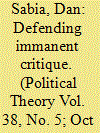

|
|
|
|
|
| Publication |
2010.
|
| Summary/Abstract |
This article develops, illustrates, and defends a conception of immanent critique. Immanent critique is construed as a form of hermeneutical practice and second-order political and normative criticism. The common charge that immanent critique is a form of philosophical conventionalism necessarily committed to value relativism and to the rejection of transcultural and cosmopolitan norms is denied. But immanent critique insists that meaningful and potentially efficacious criticism must be connected to relevant criteria and understandings internal to the culture or social order at which the criticism is directed. The complaint that this demand will likely limit political and moral criticism is also denied, and the ability of immanent critique to develop from convention unconventional thinking is defended and demonstrated.
|
|
|
|
|
|
|
|
|
|
|
|
|
|
|
|
| 8 |
ID:
111193
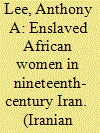

|
|
|
|
|
| Publication |
2012.
|
| Summary/Abstract |
Fezzeh Khanom (c. 1835-82), an African woman, was a slave of Sayyed 'Ali-Mohammad of Shiraz, the Bab. Information about her life can be recovered from various pious Baha'i histories. She was honored, and even venerated by Babis, though she remained subordinate and invisible. The paper makes the encouraging discovery that a history of African slavery in Iran is possible, even at the level of individual biographies. Scholars estimate that between one and two million slaves were exported from Africa to the Indian Ocean trade in the nineteenth century, most to Iranian ports. Some two-thirds of African slaves brought to Iran were women intended as household servants and concubines. An examination of Fezzeh Khanom's life can begin to fill the gaps in our knowledge of enslaved women in Iran. The paper discusses African influences on Iranian culture, especially in wealthy households and in the royal court. The limited value of Western legal distinctions between slavery and freedom when applied to the Muslim world is noted.
|
|
|
|
|
|
|
|
|
|
|
|
|
|
|
|
| 9 |
ID:
089677
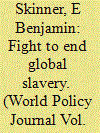

|
|
|
|
|
| Publication |
2009.
|
| Summary/Abstract |
Human trafficking may be just the latest topic du jour among U. S. humanitarian types, but mention the underlying crime- slavery to foreign officials and the rection is often confused and explosive. For God's sake, don't go talking about brutal slavery here, says Jay Kumar, the social secretary of Araria, one of the poorest districts in Bihar, the poorest state in India.
|
|
|
|
|
|
|
|
|
|
|
|
|
|
|
|
| 10 |
ID:
186392
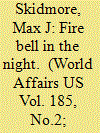

|
|
|
|
|
| Summary/Abstract |
Abortion is an issue around the world, varying in intensity by location. In the United States, it generates enormous controversy, especially because Protestant fundamentalists have joined Roman Catholics in strenuous opposition and have essentially captured one of the two major political parties. This extended commentary essay contends that anti-abortion arguments are flawed and that an effective anti-abortion policy requires a harsh authoritarian, if not totalitarian, government, fueled by misogyny and disregard for human rights. Such policies force pregnant women into what must be described as a condition of slavery.
|
|
|
|
|
|
|
|
|
|
|
|
|
|
|
|
| 11 |
ID:
168216
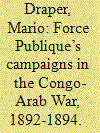

|
|
|
|
|
| Summary/Abstract |
Between 1892 and 1894 the Force Publique of King Leopold II’s Congo Free State engaged in a series of little-known counter-insurgency operations against ivory and slave traders from Zanzibar, commonly referred to as Arabs. Without a particularly strong tradition of imperial service, this article argues that the predominantly Belgian officer corps borrowed and adapted methods used by more experienced colonial forces in the 19th Century. Whether taken from existing literature or learned through experience, it reveals that the Force Publique’s counter-insurgency methods reflected many of the more recognisable aspects of traditional French and British approaches. It suggests that, despite the unique nature of each colonial campaign, basic principles could be adapted by whomsoever to overcome the military and political challenges of colonial conquest. The Force Publique’s campaigns in the Congo-Arab War, therefore, provide further evidence as to how some base theories could be universally applied.
|
|
|
|
|
|
|
|
|
|
|
|
|
|
|
|
| 12 |
ID:
113400


|
|
|
|
|
| Publication |
2012.
|
| Summary/Abstract |
Last spring, while Tunisians and Egyptians erupted in the most determined and optimistic political protest movements seen in two generations, southern Sudanese prepared to secede. And in July, after months of watching dramatic images from the demonstrators in Tahrir Square, the world was presented with pictures of a new country with a beautiful, colorful new flag, of thousands of people who had voted into existence the Republic of South Sudan. On Al-Jazeera, CNN, and BBC, interviews with southern Sudanese revealed the profound relief and freedom that these new citizens felt as they repeated the word "liberation" to describe their feelings in this heady moment of independence.
|
|
|
|
|
|
|
|
|
|
|
|
|
|
|
|
| 13 |
ID:
134175
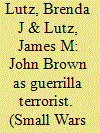

|
|
|
|
|
| Publication |
2014.
|
| Summary/Abstract |
John Brown is usually not considered to have been a terrorist, and even recent analyses of his activities consider him to be a guerrilla fighter or insurgent in his activities in Kansas. Brown, however, meets the criteria of a terrorist more than a guerrilla fighter when his activities in the Kansas Territory are considered. His raid on Harpers Ferry, however, is more in line with guerrilla operations or insurgent activities.
|
|
|
|
|
|
|
|
|
|
|
|
|
|
|
|
| 14 |
ID:
173843
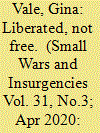

|
|
|
|
|
| Summary/Abstract |
In 2014, the Islamic State (IS) group launched a genocidal campaign against the Yazidis in Northern Iraq. IS used varied means to attack and fragment the Yazidi community: massacre of men; indoctrination and training of young boys; forced conversion of families; and kidnapping, enslavement, and rape of women and girls. Academic and policy attention has predominantly focused on IS’ sexual violence and rape of young Yazidi women and girls. This has led to the accounts of other female captives – namely, older women and undivided families – being overlooked or undervalued, excluding important elements of IS’s broader strategy of persecution. This paper analyses women’s varied experiences of captivity to reveal a fragmented population of female captives and seeks to demonstrates that IS exploited Yazidism’s religious and sociocultural customs to ensure that the impacts of its genocide – for the women themselves and the wider Yazidi community – continue beyond liberation. It concludes that although progress has been made to cope with trauma, displacement, and abuse, the community remains both physically and culturally fragmented.
|
|
|
|
|
|
|
|
|
|
|
|
|
|
|
|
| 15 |
ID:
117968
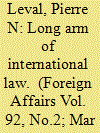

|
|
|
|
|
| Publication |
2013.
|
| Summary/Abstract |
In late 1945, the Allied victors of World War II established a military tribunal in Nuremberg, Germany, which convicted Nazi leaders for their wartime atrocities. The animating principle of the trials was that conduct of extreme inhumanity violated the part of international law that protects fundamental human rights, which applies everywhere, even though the conduct was authorized by German law under the Third Reich. Since then, the world has accepted that the worst human rights abuses -- including genocide, slavery, torture, and war crimes -- are crimes prohibited by international law, even if they are expressly permitted by the laws of the state in which they occur.
|
|
|
|
|
|
|
|
|
|
|
|
|
|
|
|
| 16 |
ID:
117510


|
|
|
|
|
| Publication |
2012.
|
| Summary/Abstract |
Jamaica is one of the few Commonwealth countries that still recognises the Privy Council in London as its court of final appeal. This article argues that the monarchy in Jamaica should be replaced by a republican form of government and that the Privy Council should be replaced as the final appellate tribunal by the Caribbean Court of Justice. In the view of the author, this is an issue that goes to the heart of the identity and self-image of the Jamaican people, and it is rooted in the cry for freedom of Jamaicans' enslaved ancestors.
|
|
|
|
|
|
|
|
|
|
|
|
|
|
|
|
| 17 |
ID:
153664
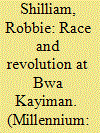

|
|
|
|
|
| Summary/Abstract |
It is no longer remarkable to claim that, out of all the revolutions in the making of the modern world order, the Haitian Revolution was the most radical and remains the most challenging to Euro-Western narratives. The Haitian Revolution did what no other did – end slavery – in an age when white Europeans and North Americans spoke of natural rights and freedoms while they remained traffickers and brutal exploiters of African flesh. The stakes at play are significant: To theorise and narrate the Haitian Revolution is to necessarily take part in a struggle over the authorship of the meaning of global justice and modern freedoms. But as we deepen our understandings of the Revolution we must grapple more audaciously with the intellectual strictures that have in various ways ‘silenced’ these struggles of enslaved Africans. Race informs these silencings. Fundamentally, race silences the response to slavery. In this article, I return to Bwa Kayiman – the meeting that inaugurated a world-shaking response.
|
|
|
|
|
|
|
|
|
|
|
|
|
|
|
|
| 18 |
ID:
177051
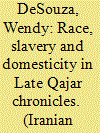

|
|
|
|
|
| Summary/Abstract |
This article examines cultural attitudes on race and African slavery in late Qajar chronicles prior to abolition in 1929. In contrast to previous scholarship, Qajar textual sources reveal that elite cultural attitudes were relevant in structuring the social conditions of enslavement in Iran. Visual depictions and narratives about African eunuchs and concubines naturalized the violent acquisition and use of the Other. Slave narratives also bear witness to how such views of African corporeality determined the social worth of eunuchs and concubines in the domestic sphere.
|
|
|
|
|
|
|
|
|
|
|
|
|
|
|
|
| 19 |
ID:
174163
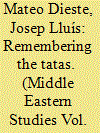

|
|
|
|
|
| Summary/Abstract |
Affluent families in Tetouan (Morocco) had female domestic servants from slave origins until well into the twentieth century. I present here a reconstruction of the trajectories and living conditions of those women, based on the recent memory of the slave-owning families themselves. This exercise raises different methodological challenges about the use of memory, while allowing us to present the transformations that the slavery system underwent in colonial Morocco. The position of female domestic servants was diverse and paradoxical, since in many cases they achieved a degree of closeness with the families, while at the same time finding themselves under a system of class and gender domination.
|
|
|
|
|
|
|
|
|
|
|
|
|
|
|
|
| 20 |
ID:
067399
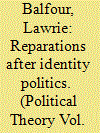

|
|
|
|
|
|
|
|